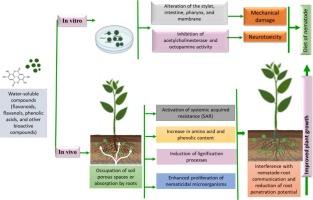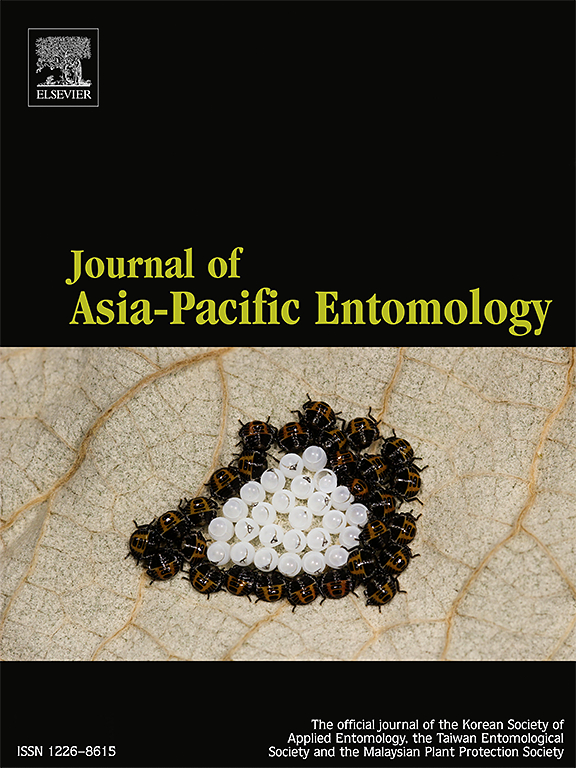芳香和药用植物是否能有效防治半透叶菊?来自体外和体内研究的证据
IF 1.3
3区 农林科学
Q3 ENTOMOLOGY
引用次数: 0
摘要
半透叶霉(Tylenchulus semipenetrans)是一种破坏性极强的专性植物寄生线虫(PPN),对柑橘作物构成严重威胁。使用化学杀线虫剂已被证明对减少半透线虫种群有效;然而,重复使用会对环境产生负面影响,因此需要采取更多的生态战略。在温室和实验室条件下,研究了迷香、野月桂和马鞭草3种芳香药用植物对半透蛾的杀线虫效果,包括对幼虫J2的死亡率和对卵孵化的抑制。结果表明,所有AMPs水提液对半透虫均有毒性,J2死亡率为25.85% ~ 75.17%,而对照处理的J2死亡率为1.0 ~ 13.6%。鸡蛋的孵化率在0%到66%之间,而对照处理的孵化率为73%到95%。毒力随AMPs水提物浓度的增加和孵育时间的延长而增加,96 h后死亡率达到55.44%以上,10%的水提物孵育144 h后完全抑制卵孵化。在温室试验中,与对照处理的997.30根/100克土壤和185根线虫的数量相比,石斛水提物对半穿透线虫的活性较高,线虫的数量大幅减少,为475根/100克土壤和122根/10克根系。本研究结果表明,所研究的AMPs可以作为一种生物杀线虫剂用于治疗半透线虫。本文章由计算机程序翻译,如有差异,请以英文原文为准。

Can aromatic and medicinal plants effectively control Tylenchulus semipenetrans? Evidence from in vitro and in vivo studies
Tylenchulus semipenetrans is a highly damaging obligate plant parasitic nematode (PPN) that poses a significant threat to citrus crops. The use of chemical nematicides has proven effective in reducing T. semipenetrans populations; however, repeated use can have negative environmental impacts, necessitating the adoption of more ecological strategies. The current study aimed to evaluate the nematicidal effect of three aromatic and medicinal plants (AMPs), Rosmarinus officinalis, Laurus nobilis and Verbena officinalis against T. semipenetrans in terms of juvenile J2 mortality and eggs hatch inhibition under greenhouse and laboratory conditions. The results showed that all AMPs aqueous extracts exhibited toxicity against T. semipenetrans, with J2 mortality ranging between 25.85 % and 75.17 %, compared to 1.0 to 13.6 % in the control treatment. Egg hatching varied between 0 % and 66 %, compared to 73 to 95 % in control treatment. Toxicity increased with increasing AMPs aqueous extract concentration and incubation period, reaching more than 55.44 % mortality after 96 h and complete egg hatching inhibition after 144 h of incubation at an R. officinalis aqueous extract concentration of 10 %. In the greenhouse experiment, the aqueous extract of R. officinalis was highly active against T. semipenetrans, resulting in a substantial reduction in nematode populations, with counts ranging from 475 nematodes/100 g of soil and 122 nematodes/10 g of roots, compared to populations of 997.30 nematodes/100 g of soil and 185 nematodes/10 g of roots in the control treatment. The results of this study suggest that AMPs studied, could be used as a bionematicide product for managing T. semipenetrans.
求助全文
通过发布文献求助,成功后即可免费获取论文全文。
去求助
来源期刊

Journal of Asia-pacific Entomology
Agricultural and Biological Sciences-Insect Science
CiteScore
2.70
自引率
6.70%
发文量
152
审稿时长
69 days
期刊介绍:
The journal publishes original research papers, review articles and short communications in the basic and applied area concerning insects, mites or other arthropods and nematodes of economic importance in agriculture, forestry, industry, human and animal health, and natural resource and environment management, and is the official journal of the Korean Society of Applied Entomology and the Taiwan Entomological Society.
 求助内容:
求助内容: 应助结果提醒方式:
应助结果提醒方式:


